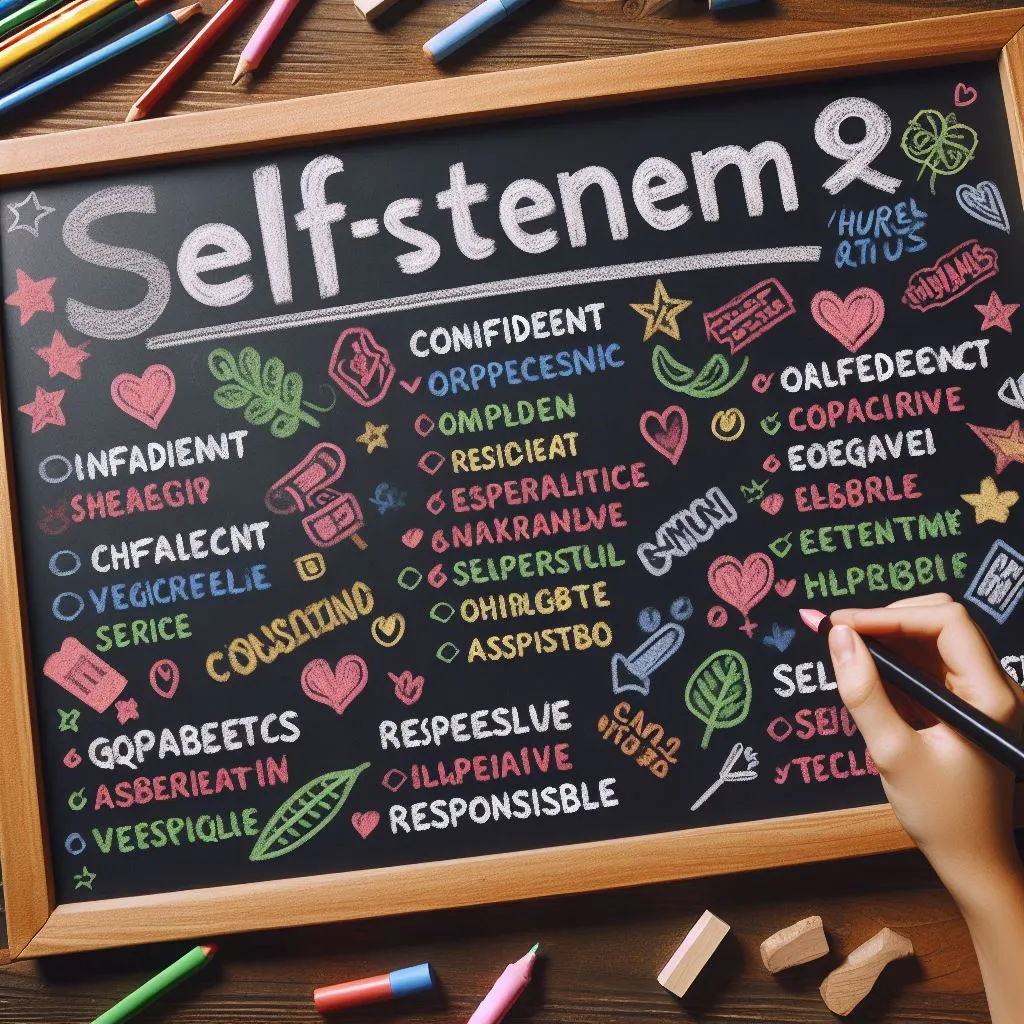Hey there! Ever met someone who just seems super confident and happy with themselves? They’re like a ray of sunshine, spreading positivity wherever they go. What makes them tick?
Well, it’s all about how they see themselves. So, let’s dive into what makes these people so awesome which characteristic best describes someone who has positive self-esteem?
When considering the question, “Which characteristic best describes someone who has positive self-esteem?” the answer is clear: self-confidence. Self-confidence is the defining trait that sets individuals with positive self-esteem apart from others.
The Power of Self-Confidence: The Standout Characteristic of Positive Self-Esteem
Self-confidence is the belief in one’s abilities, judgment, and personal worth. It is the unshakable trust that an individual has in their capacity to face challenges, make decisions, and shows the way of complexities of life. Self-confident individuals are not easily swayed by the opinions of others or discouraged by setbacks. They possess an unwavering belief in their potential and are driven to succeed.
Self-esteem is the reputation we acquire with ourselves.
The connection between self-confidence and positive self-esteem is undeniable. Self-esteem is the overall evaluation of one’s worth and value as a person, while self-confidence is the belief in one’s abilities and potential.
When an individual has high self-esteem, they are more likely to have self-confidence in their abilities, which in turn leads to greater success and happiness.
Here are some key reasons why self-confidence is the standout characteristic of individuals with positive self-esteem:
- Self-confidence breeds success: Self-confident individuals are more likely to take risks, seize opportunities, and persist in the face of adversity. This persistence leads to greater achievements and success in various aspects of life, including career, relationships, and personal growth.
- Self-confidence fosters resilience: Individuals with high self-esteem and self-confidence are more resilient in the face of setbacks and failures. They view challenges as opportunities to learn and grow, rather than as insurmountable obstacles. This resilience enables them to bounce back quickly and continue pursuing their goals.
- Self-confidence improves relationships: Self-confident individuals are better equipped to build and maintain healthy relationships. They are assertive, communicate effectively, and are more likely to express their needs and desires openly. This open communication increase trust and understanding in relationships, leading to stronger connections with others.
- Self-confidence enhances well-being: Self-confidence is closely linked to overall well-being and happiness. Individuals with high self-esteem and self-confidence report higher levels of life satisfaction, better mental health, and lower levels of stress and anxiety.
5 More Characteristic That Best Describes Someone Who Has Positive Self-Esteem
Self-Awareness

Self-awareness is the ability to recognize and understand one’s own thoughts, feelings, values, and behaviors. It is a key characteristic of individuals with positive self-esteem, as it enables them to make informed decisions, set realistic goals, and develop strategies for personal growth and development. For more better understanding i recommend read this book The Power of Self-Awareness in a Self-Deluded World by Tasha Eurich
I tell you the story of my friend, my friend is someone who truly embodies the qualities of positive self-esteem.
They have a deep understanding of themselves, which allows them to approach life with confidence and self-assurance. but how they have deep understanding of themselves? check this!. So, They know who they are and what they stand for, and they aren’t afraid to express their thoughts and feelings.
Self-awareness contributes to positive self-esteem in several ways:
- Improved decision-making: Self-awareness enables individuals to make informed decisions based on their values, strengths, and weaknesses. They are better able to assess situations and choose the best course of action, which leads to greater success and satisfaction.
- Increased resilience: Self-awareness helps individuals to recognize and manage their emotions, which increases their resilience in the face of challenges and setbacks. They are better able to cope with stress and adversity, and they are more likely to bounce back quickly from difficult situations.
- Enhanced relationships: Self-awareness enables individuals to communicate effectively and build strong, supportive relationships. They are better able to understand and express their own needs and desires, and they are more empathetic and responsive to the needs of others.
- Greater self-acceptance: Self-awareness fosters self-acceptance, as individuals are better able to recognize and accept their strengths, weaknesses, and limitations. They are less likely to engage in self-criticism and more likely to practice self-compassion.
Self-Compassion
Self-compassion is the ability to be kind and understanding towards oneself, especially during times of failure or setbacks. It is a key characteristic of individuals with positive self-esteem, as it enables them to recognize and accept their imperfections, learn from their mistakes, and cultivate resilience in the face of adversity.
Self-compassion is simply giving the same kindness to ourselves that we would give to a good friend.
Individuals with positive self-esteem practice self-compassion by treating themselves with the same kindness and understanding that they would offer to a close friend or loved one.
They recognize that everyone makes mistakes and that self-improvement is a journey, not a destination. They avoid harsh self-criticism and instead practice self-forgiveness and self-care.
Self-compassion contributes to positive self-esteem in several ways:
- Improved resilience: Self-compassion helps individuals to cope with challenges and setbacks by fostering resilience. They are better able to recognize and manage their emotions, and they are more likely to view setbacks as opportunities for growth and learning.
- Enhanced well-being: Self-compassion is linked to greater overall well-being and happiness. Individuals who practice self-compassion report higher levels of life satisfaction, better mental health, and lower levels of stress and anxiety.
- Increased motivation: Self-compassion can increase motivation by reducing fear of failure and promoting a growth mindset. Individuals who practice self-compassion are more likely to take on new challenges and persist in the face of obstacles.
- Better relationships: Self-compassion fosters empathy and understanding towards others, which can improve relationships and social connections. Individuals who practice self-compassion are better able to recognize and respond to the needs of others, and they are more likely to form strong, supportive relationships.

Self-Efficacy
Self-efficacy is the belief in one’s own ability to accomplish goals and overcome challenges. It is a crucial characteristic of individuals with positive self-esteem, as it enables them to approach tasks and situations with confidence and determination.
Individuals with high self-efficacy believe in their ability to succeed, even in the face of adversity. They are more likely to take on challenges, persist in the face of obstacles, and recover quickly from setbacks.
They are also more likely to set and achieve ambitious goals, and to feel a sense of accomplishment and satisfaction in their achievements.
Self-Respect
Self-respect is the belief in one’s own worth and value, and the commitment to upholding one’s own dignity and integrity. It is a fundamental characteristic of individuals with positive self-esteem, as it enables them to set healthy boundaries, communicate assertively, and prioritize their own needs and desires.
Individuals with positive self-esteem practice self-respect by treating themselves with kindness, respect, and dignity. They recognize their own worth and value, and they refuse to tolerate mistreatment or disrespect from others. They are assertive in communicating their needs and desires, and they are willing to walk away from situations or relationships that do not align with their values or goals.
Self-respect contributes to positive self-esteem in several ways:
- Improved self-confidence: Self-respect fosters self-confidence by reinforcing the belief in one’s own worth and value. Individuals who practice self-respect are more likely to trust their own judgment and abilities, and they are less likely to be swayed by the opinions or criticisms of others.
- Healthier relationships: Self-respect enables individuals to form healthier, more fulfilling relationships. They are better able to communicate their needs and boundaries, and they are more likely to attract and maintain relationships with individuals who treat them with respect and kindness.
- Enhanced decision-making: Self-respect promotes better decision-making by enabling individuals to prioritize their own needs and values. They are less likely to make decisions based on external pressures or the expectations of others, and they are more likely to make choices that align with their own goals and values.
- Increased resilience: Self-respect fosters resilience by enabling individuals to cope with challenges and setbacks in a healthy and productive way. They are better able to recognize and reject self-limiting beliefs and negative self-talk, and they are more likely to bounce back quickly from setbacks.
Self-Acceptance
Self-acceptance is the ability to embrace oneself, flaws and all, and to recognize one’s inherent worth and value as a human being. It is a crucial characteristic of individuals with positive self-esteem, as it enables them to approach life with a sense of self-compassion, self-forgiveness, and self-love.
Your self-worth is determined by you. You don’t have to depend on someone telling you who you are.
Individuals with high self-acceptance recognize that they are imperfect and that they will make mistakes. However, they do not let these imperfections define them, nor do they let them prevent them from pursuing their goals and dreams. Instead, they approach life with a sense of curiosity and openness, and they are willing to learn and grow from their experiences.
All the stories are just supposed for your better understanding.
References
- Bandura, A. (1977). Self-efficacy: Toward a unifying theory of behavioral change. Psychological Review, 84(2), 191-215.
- Lent, R. W., Brown, S. D., & Hackett, G. (1994). Toward a unifying social cognitive theory of career and academic interest, choice, and performance. Journal of Vocational Behavior, 45(1), 79-122.
- Stajkovic, A. D., & Luthans, F. (1998). Self-efficacy and work-related performance: A meta-analysis. Psychological Bulletin, 124(2), 240-261.
- Taylor, S. E., & Brown, J. D. (1988). Illusion and well-being: A social psychological perspective on mental health. Psychological Bulletin, 103(2), 193-210.
- Duval, T., & Wicklund, R. A. (1972). A theory of objective self-awareness. Academic Press.


